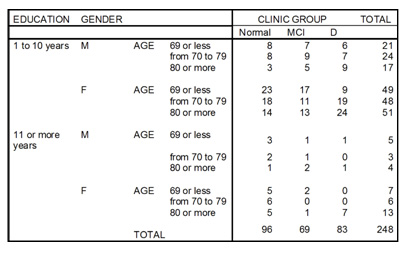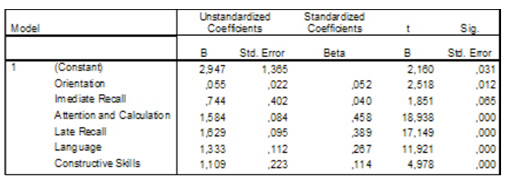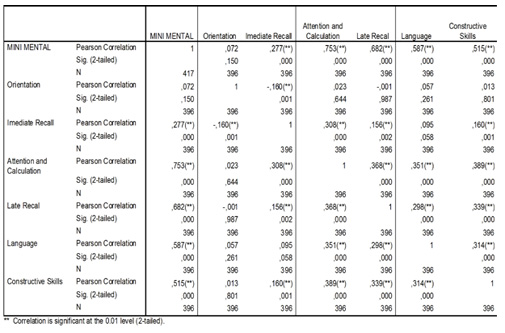Desarrolado por Marshall Folstein, el MMSE es usado por investigadores y clínicos en todo el mundo y Portugal no es una excepción. El presente estudio pretende evaluar las diferencias en el género, educación, edad y grupo clínico (Demencia, deterioro cognitivo y populación normal) en el total del MMSE y en sus subpuntuaciones. La muestra estuvo compuesta por 417 personas (Normal:96; DCL: 71 y demencia 83). Se presentan los resultados y se demuestra que género, edad y educación teníaan algunos efectos en las puntuaciones.
Funcionamiento cognitivo del anciano. Estudio exploratorio con el MMSE en Portugal.
(Cognitive functioning in elderly: Portuguese exploratory study with the Mini Mental State Examination (MMSE). )
Horácio Firmino2; Mário R. Simões1; Joana Araújo12; Sofia Andrade12; Mónica Martins12; Fátima Almeida1; Joana Martins1; Manuela Vilar2; Joana Noronha2; Maria Salome Pinho2.
Calouste Gulbenkian Fundation project in the scope of the financing of neurosciences research projects in the elderly.
1 Faculty of Psychology and Educational Sciences, University of Coimbra.
2 Psiquiatric Clinic, University hospital, Coimbra.
Resumen
Desarrolado por Marshall Folstein, el MMSE es usado por investigadores y clínicos en todo el mundo y Portugal no es una excepción. El presente estudio pretende evaluar las diferencias en el género, educación, edad y grupo clínico (Demencia, deterioro cognitivo y populación normal) en el total del MMSE y en sus subpuntuaciones. La muestra estuvo compuesta por 417 personas (Normal:96; DCL: 71 y demencia 83). Se presentan los resultados y se demuestra que género, edad y educación teníaan algunos efectos en las puntuaciones.
Abstract
Developed by Dr Marshall Folstein in the 1970s, the Mini Mental State Examination (Folstein, 1975) is used by researchers and clinicians worldwide and Portugal is no exception. Originally designed to be sensitive to cognitive impairment, the MMSE is a brief, quantitative measure of cognitive status in adults within neurological, psychiatric and geriatric populations. It can be used to screen for cognitive impairment, to follow the course of cognitive changes in an individual over time, to document an individual’s response to treatment, and contributes to a possible diagnosis of dementia. The main goals of this work is to analyze the differences of gender, education, age and clinic groups (normal, mild cognitive impairment and dementia) on MMSE total scores and identify the MMSE subscores that better correlate and have more impact on the total score. Sample consisting on 417 educated subjects with mean age 74, 76, mean years of education 5, 45 and MMSE mean score 24, 67. To analyze MMSE subtests 396 subjects were valid and 248 subjects were evaluated in the context of a clinical interview and after using the DSM-IV diagnostic criteria are distributed by the following groups: Normal (96); Mild Cognitive Impairment (71) and Dementia (83- AD and Va+AD). Similar to previous studies ( Brito-Marques, Cabral, 2003; Rosselli, Ardila, et al. , 2000; Rosselli, Tappen, et al. , 2006) we could conclude that there is evidence that education, age and gender have some effect on MMSE scores, though more investigation is needed to clarify these differences within the Portuguese population. The MMSE subtests that have more impact on total score are Late Recall and Attention and Calculation. Those that best correlate with total score are Attention and Calculation and Late Recall.
Introdution
Developed by Dr Marshall Folstein in the 1970s, the Mini Mental State Examination (Folstein, 1975) is used by researchers and clinicians worldwide and Portugal is no exception. Originally designed to be sensitive to cognitive impairment, the MMSE is a brief, quantitative measure of cognitive status in adults within neurological, psychiatric and geriatric populations. It can be used to screen for cognitive impairment, to follow the course of cognitive changes in an individual over time, to document an individual’s response to treatment, and contributes to a possible diagnosis of dementia.
The MMSE is used to obtain information over a number of cognitive areas such as: orientation - time (5 points) and location (5 points), memory - immediate recall (3 points) and late recall (3 points), attention and calculation (5 points), language - naming (2 points), repeating a phrase (1 point), following a three-stage command (3 points), reading (1 point), writing a sentence (1 point), constructive skills (1 point). Therefore total scores on MMSE range from 0 to 30 points, with the following cut of points for the Portuguese population: considered impaired if scores below or equal to 27 with 11 or more years education, below or equal to 22 with 1 to 11 years of education, and below or equal to 15 with no education (Guerreiro, 1998).
Objectives and methods
The main goals of this work is to analyze the differences of gender, education, age and clinic groups (normal, mild cognitive impairment and dementia) on MMSE total scores and identify the MMSE subscores that better correlate and have more impact on the total score.
Sample consisting on 417 educated subjects with mean age 74, 76, mean years of education 5, 45 and MMSE mean score 24, 67. To analyze MMSE subtests 396 subjects were valid and 248 subjects were evaluated in the context of a clinical interview and after using the DSM-IV diagnostic criteria are distributed by the following groups: Normal (96); Mild Cognitive Impairment (71) and Dementia (83- AD and Va+AD).
T-test and ANOVA were performed to assess mean differences on gender, education, age and clinic groups. Linear Regression was used to identify the subtests with more impact on the total MMSE score and a bivariate correlation to correlate MMSE total and subtests. All statistiscs performed with SPSS package 15. 0.
Distribution of the total sample by education, gender and age
Distribution of the sample with clinical diagnostic by education, gender, age and clinical group
Results
Analyzing our total sample we found no significant differences in mean of ages (t= -1, 90, df= 415, p=0, 058) between men (73, 71) and women (75, 48), nor in the mean of years of education (t= 0, 71, df= 415, p= 0, 481 with 5, 60 for men and 5, 34 for women. Though, when dividing the sample into groups of ages ( 69 or less, 70 to 79 and 80 or more) we found significant differences on gender [F(1, 415)=5, 93, p=0, 015]. This difference is due to a higher number of women in the older group allowed by their longevity. No differences were found [ t= 0, 678, df= 415, p= 0, 498) when dividing sample into groups of education (1 to 10 and more than 11). Significant differences were found in MMSE mean scores by gender (t= 3, 68, df=415, p= 0, 000), group of ages [F(2, 414)= 15, 82, p= 0, 000], education (t= -2, 71, df= 415, p= 0, 007) and clinic groups [F(2, 245)= 345, 87, p= 0, 000].
We found that the subtests that have a larger impact on the total score of MMSE are Late Recall and Attention and Calculation. Immediate Recall was not a significant predictor in this model.
Performing a bivariate correlation among the total MMSE score and its subtests, a strong correlation was found between total MMSE and Attention and Calculation (r = 0, 753, n = 396, p<0, 0005), and Late Recal (r = 682, n = 396, p<0, 0005), followed by Language (r = 0, 587, n = 396, p<0, 0005), and Constructive Skills (r = 0, 515 n = 396, p<0, 0005).
Conclusions
Similar to previous studies ( Brito-Marques, Cabral, 2003; Rosselli, Ardila, et al. , 2000; Rosselli, Tappen, et al. , 2006) we could conclude that there is evidence that education, age and gender have some effect on MMSE scores, though more investigation is needed to clarify these differences within the Portuguese population. The MMSE subtests that have more impact on total score are Late Recall and Attention and Calculation. Those that best correlate with total score are Attention and Calculation and Late Recall. Our future studies need to assess: (i) the relationships between scores on MMSE by different groups [clinical groups (MCI versus Dementia) and normal aging Portuguese population; (ii) other statistic tests like reliability (test-retest results, internal consistency) and validity (Confirmatory Factor Analysis).
References
Brito-Marques P. , Cabral J. 2004. The Role of education in mini mental state examintion. Arq. Neurop. . 62(2-A): 206-211.
Guerreiro, M. 1998. Contributo da neuropsicologia para o estudo das demencias. Tese de doutoramento apresentada à faculdade de medicina de Lisboa.
Rosselli, D. , Ardila, A. , et al. 2000. El examen mental abreviado (mini mental state examination) como prueba de selección para el diagnostico de demencia: estudo poblacional colombiano. Rev. Neurol. 30(5):428-432.
Rosselli M. , Tappen, R. , et al. 2006. The relation of education and gender on the attention items of the Mini-Mental State Examination in Spanish speaking Hispanic elders. Arch Clin Neuropsychol. 21(7): 677–686.
IMPORTANTE: Algunos textos de esta ficha pueden haber sido generados partir de PDf original, puede sufrir variaciones de maquetación/interlineado, y omitir imágenes/tablas.



